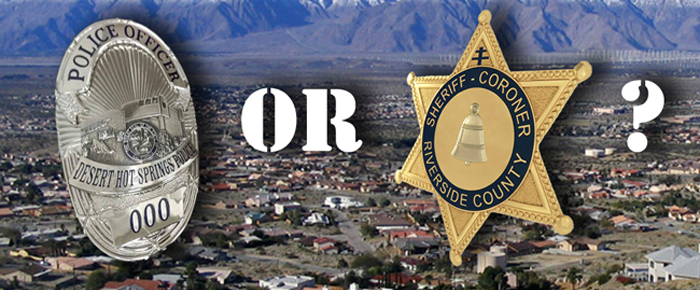
By Heidi Simmons
Most who make Desert Hot Springs home love their community. They appreciate the mountain and valley views, the clean air and water, the open desert and blue sky. Their neighbors are generous and genuine. Children play outside and people are out walking. But, for outsiders, they don’t see the city’s positive attributes or its growing quality of life. All they know is what they hear on the news and that news is often about crime.
Over the years, public safety has been a priority for the city of Desert Hot Springs and it has paid off with a community sense of well-being. Certainly, there was a time when if you saw kids in a yard or people walking in your neighborhood, they were up to no good. But the police department has changed that. Residents feel safe and they have come to trust and respect their local law enforcement.
“I’m always glad to see the police patrolling the community,” said Gretchen Walker. “You can see them up and down Palm Drive at night on the weekends. Their regular presence is reassuring. I know if I had to call them, they’d be here right away.”
Having quality police officers and adequate protection has made Desert Hot Springs residents friendlier, more trusting and secure. It has improved their lives and made living in the city a good experience. They may even admit publicly that they are proud to call Desert Hot Springs home.
Local Police or Sheriff’s Department?
The Desert Hot Springs Police Department was established in 1997. With a new police presence and reliable public safety, the city grew and prospered. Prior to having local police, the city used the County Sheriff who had a small substation in town.
The local police department has since worked hard to protect and serve the community. Detective Sergeant Gustavo Paiz has been with the police department since 2001. He and his young family live in the city. “I know the city well. I know which cars belong in which driveways,” said Paiz. “When I’m out shopping, residents come up to me and say hello. Even those I’ve arrested. As a police force we know where the trouble is and who is making it.”
Local businesses have also benefitted by having a dependable police department. “Through the sweeps, keeping a tight reign on parolees and local relationships developed over the years between the community and law enforcement, the police bring a sense of security to businesses,” said Heather Coladonato, President of the Desert Hot Springs Chamber of Commerce. “They are not just officers, they are familiar members of the community.” There are 1,419 businesses licensed in the city.
But the public safety that Desert Hot Springs citizens have come to know may be about to change.
Financial Crisis
Last November, the city uncovered a financial crisis. Some say they saw it coming, while others apparently were taken by complete surprise. Apparently, the fiscal disaster was caused by bad city management, a hidden fund and irresponsible outside auditors. Indeed some of the money matters were directly caused by lack of redevelopment funds and economic trends for which the city had no control. But the city stepped up to contain the problem and stop bankruptcy by declaring a “Fiscal Emergency.”
With a short fall of $6.9 million, the city rallied its resources and slashed its budget. As the city’s largest expenditure, public safety was cut by $1.7 million.
Under new financial constraints, the city closed gaps and stabilized the cash flow. They have successfully generated enough reserves to pay bills and meet payroll. Although public safety is funded, it is not where it was prior to the crisis.
Before the “Fiscal Emergency,” when Chief Williams was at the helm, the police department’s budget was $9.1 million. The department had a total of 34 officers and support staff; today, the total is 16. The budget is $6.1 million. Officers have taken salary cuts up to 44%. The police are currently working overtime to meet the city’s needs. Currently, two officers are out with job related injuries.
Half of the police officers live in town or in neighboring cities. Retaining or attracting good cops is a serious issue when maintaining quality public safety. Having officers who live in the city makes them a member of the community with a vested interest, adds to their accessibility and knowledge of the residents.
The city’s budget crisis, and lack of public safety revenue, has brought about the debate whether the police or the Sheriff can better serve the community.
Measure F to the Rescue
Last June, a measure was put on the ballot that if passed, would have guaranteed funds specifically for public safety. The President of the DHS Police Officers Association, Mike Valentich issued a press release saying Measure F would provide the funds necessary to protect Desert Hot Springs residents, businesses, tourists and families. The tax was only on vacant parcels not on homeowners.
If Measure F passed, funding for public safety and the police department would have been ample and the debate about either keeping the local police department or contracting with the Sheriff might have finally come to a close. But Measure F failed.
“I wanted Measure F to pass,” said Mayor Pro Tem Russell Betts. “If it passed, it wasn’t a question about keeping our police. Of course we would keep the police department.” Betts explained that there are limits to how much City Hall can do to support ballot measures. And clearly, the city was not in a position to use public resources to fund a campaign in favor of Measure F. (In reaching out to the Mayor and other council members for this article, Betts was the only one to respond.)
New Measures
Now, three new measures are on the ballot. The General Election this November will have: Measure HH is a Medical Marijuana Cultivation Tax (Grow marijuana), Measure II is a Medical Marijuana Tax (Sell marijuana), and Measure JJ is a One Percent Sales, Transaction and Use Tax Increase. The revenue from the new measures would go directly into the city’s general fund.
Unlike Measure F, there are no provisions specifically for public safety. Nor is there any guarantee that if the new measures pass, the city will keep the local police department. The POA has officially endorsed Measure JJ.
In a press release, the Desert Hot Springs Chamber of Commerce said they voted unanimously to support Measure JJ, but added a caveat that the City Council works diligently to ensure that the “development welcome mat” is out while protecting the interests of the greater community.
However, if one or all — or none — of the measures pass, Desert Hot Springs will still have to find the most cost effective way to provide the best public safety.
Betts believes the new interim police chief, Charles Maynard, is doing an outstanding job. “I am absolutely pro public safety,” said Betts. “The city has to get its finances in order. If we are going to keep the police department, we have to find the money to support it so public safety isn’t compromised. We have to look at our options and pick the best one.”
When Betts refers to options, he is not only talking about adequate funding, but adequate police protection. Public safety can be delivered by the local police department or by the Sheriff’s department. Betts has a manufacturing background and having had success in that industry, he is looking to get the best service at the best price.
Sheriff Department Bid
“We have a bid from the Sheriff’s department that will provide 22 patrol officers plus five for administration and support,” said Betts. “For $5.7 million per year, that includes legal fees, administration costs, workman’s comp and benefits. If an officer is injured or sick, the number of Sheriffs does not go down. They fill in the gaps. Public safety is never compromised. This is not a situation like Sheriffs patrolling in unincorporated county areas.”
If the Sheriff’s Department takes the place of the local police department, it will also take over the police station facilities, cars and even uniforms. Police cruisers would still be marked Desert Hot Springs, but under that, in smaller font, it would read “Riverside County Sheriff.”
The local police would not just automatically become Sheriffs in fact they would be disbanded. However, local police officers interested in working for the Sheriff’s department could apply and go through the process like anyone else who wants to work for the Sheriff. A position in Desert Hot Springs is not guaranteed. On the other hand, the city could stipulate an agreement with the Sheriff to incorporate local police officers, but so far, no such gesture has been made.
The contract with the Sheriff’s Department would be for five years. Every year there is a 5% increase to compensate for negotiated raises. If the city should once again have a “Fiscal Emergency,” the contract with the Sheriff cannot be renegotiated unlike with a city police force. “The contract with the Sheriff guarantees public safety,” said Betts. “They will not reduce the minimum level of public safety which they are obligated to maintain.”
There is still a question about what the Sheriff’s Department will charge above the contract for extra services such as: major incident responses, undercover narcotics or homicide investigation, parolee supervision, shift overtime, training and wage increases for Deputy Sheriffs beyond the annual 5%. Once the Sheriff is in the field, would there be “menu” items that are added to the costs beyond contract specifics?
Accountability
Perhaps the most important consideration is accountability and management of the Sheriff. Who does that? With a local police department, the city has a Public Safety Commission made up of residents who ensure there is an ongoing public forum that includes and involves citizens in the public safety process and policing issues. There is no such over sight with the Sheriff. The city would have little or no local control.
Meanwhile, while the city explores their options with the Sheriff, the Desert Hot Springs Police Officers Association (DHSPOA) submitted a new one-year contract that will expire June 30, 2015. But the details of their budget cannot be disclosed because of the POA lawsuit with the city.
Police Lawsuit
Prior to the November 2013 election, the POA had a two-year deal, July 1, 2013 thru June 30, 2015, for a new Memorandum of Understanding (MOU) or labor agreement, with then Mayor Yvonne Parks, City Council and City Manager, Rick Daniels.
The MOU was approved in closed session, offered and then ratified by the POA. But the POA was asked to delay formal ratification by the City Council until after the November election. The POA agreed.
The reason to withhold the ratification until after the election? One answer: To not influence voters. Odd, because voters are, by far, pro public safety. How could it be a bad thing to secure a new agreement with the city’s police force?
But, not only did Mayor Parks lose reelection, the new Mayor and City Council now faced a financial crisis that threatened to bankrupt the city.
In January 2014, the new City Council refused to formally ratify the POA deal. Did the City Council want to keep the local police or not? Was it really only about funding?
Normally, when a new contract is not ratified, the previous MOU remains in effect until both sides agree to a new deal, or an impasse is declared. State law mandates impasse resolution procedures.
Without following impasse resolution regulations, the City Council declared an emergency and cut the police department’s wages from the 2013 MOU by an average of over 37%.
If the city had indeed declared bankruptcy, the POA might not have had a case. But the city remained solvent. To protect their rights under the impasse resolution procedures, the POA had no choice but to sue. Otherwise, they would have waived all claims to back pay and benefits. Some officers left while others stayed and endured salary and benefit cuts.
Remember, the POA supported Measure F on the June ballot that had the majority vote, but failed to get two-thirds.
To try to keep the police department intact and save their jobs, the POA made a proposal at the September 2, City Council meeting to suspend the lawsuit until June 30, 2015.
The POA Makes Offer
The POA said they would work with the City to help pass the new sales tax, Measure JJ. Although not waiving all claims to back pay, the POA offered to temporarily work for the reduced wages and benefits imposed in December 2013.
If the sales tax passes, the revenue wouldn’t reach city coffers until March 2015.
With the passing of Measure JJ, the POA would negotiate a new MOU that would seek to return some of the back pay and attempt to reinstate their former wages and benefit level, at which time the litigation would be dismissed.
The POA asked for a commitment from the City Council to keep the police department during this period. It would give both parties more time to negotiate and keep the police department from losing officers. Not unreasonable, since the City Council had already approved the budget through the June 2015 date.
City Council Rejects Offer
The City Manager and the Chief of Police reportedly recommended accepting the POA’s proposal, but the City Council unanimously rejected it!
At the same meeting, where the City Council rejected the POA proposal, the council approved an additional $30,000 for outside attorney fees to fight the POA lawsuit, increasing the total to $180,000 with $130,000 already spent.
The POA has, both publicly and privately, urged the council to put the question of who will provide public safety services on the ballot and let the residents decide. The DHSPOA has been diligent in trying to keep the public safety issue front and center. Yes, it is the cops’ jobs at stake, but it is also their home and community.
The POA sought a preliminary injunction in Superior Court, but it was denied because recouping back pay would render the city insolvent. A trial on the permanent injunction is set for October 28, 2014.
What Now?
If the City Council indeed chooses to contract with the Sheriff, those in the police department who worked long hours and at a significant reduction in pay and benefits, would undoubtedly seek to be reimbursed in full. A figure that currently exceeds $1,000,000, making the POA’s recent offer to drop the lawsuit and negotiate for reduced back pay more reasonable.
It all begs the question: Who does the City Council really want to provide public safety and at what cost — financially and to the community?
Desert Hot Springs is a bedroom community of nearly 28,000 people. The vast majority work in other valley cities. There are five elementary schools, two middle schools and a high school. The median age is 34. It is a family community made up of first-time homeowners, retirees and renters who all want to live in a place where they feel safe to work, play and shop.
Whether at the local grocery stores or post office, residents have something to say about public safety and the debate between local police and Sheriff.
“I worry the Sheriff wouldn’t know the people and show them respect. I don’t want them to come in here and treat us like we are all bad guys, just because this is Desert Hot Springs,” said a middle aged, sun weathered man who didn’t want to give his name. “I’m also concerned about the Sheriff being overly militarized.”
Another woman chimed in, “Police or Sheriff, what’s the difference. I want what works best.”
Open House
This Saturday, October 18, the Desert Hot Springs Police Department is having an open house from 10:00am to 2:00pm to celebrate their 17 years of service. Stop by and thank them for their good work, because it may be the last opportunity you have.









































